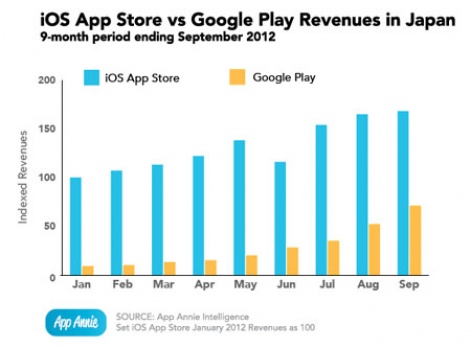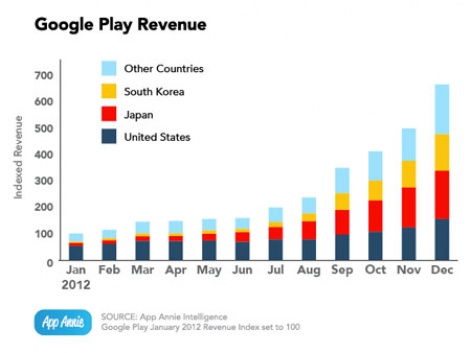It's a necessity where it pays (literally) to be accurate, whether you're tracking your own performance, or that of your competitors.
Of course, there are two side to this particular coin.
For detailed analytics about what users are doing in your games, you either build your own solution or look to providers such as Flurry.
Companies like App Annie and Distimo provide the market intelligence piece of the puzzle, by grinding through the numbers provided the app stores themselves; and then applying their analysis smarts to create a 'download and dollars' view of the industry.
Following from the Mobile Gaming USA East conference in New York, we sat down with App Annie CEO Bertrand Schmitt to get his take on the market.
Do you think the information App Annie provides helps developers make better games and/or more money?
Bertrand Schmitt: Yes. App Annie data helps developers see how their apps are performing compared to their competitors, as well as track the overall market, so they can see how well they're doing. This enables them to make better business decisions about their go-to market and monetisation strategies.
That said, we're not trying to help them tweak their games. We're not in that space. We're more of a strategy provider. We're more concerned with helping businesses decide where to go and what international markets they should invest in, while also helping them monitor whether their competitors are growing faster than they are.
We are also focused on providing the best available free resources to the industry through our Store Stats and Analytics products and monthly reports.
For example, we recently published two free reports on the state of the app market, the App Annie Index January 2013, and World Series of Apps: Japan, that provide insight into market trends.

We give users all of this great information, but after that it's up to them to decide how to put it to work for their business. We don't currently offer consultancy services.
Your system is passive - working off app stores - while some companies require the integration of an SDK, and hence can provide a more detailed picture of how the app ecosystem works.
Do you expect to move in the realm of requiring technology integration, so you can provide better data?
Some companies do offer this, however they are not direct competitors to us. During our panel at Mobile Gaming USA East, the moderator asked, "Who uses Flurry?" and "Who uses App Annie?" and the same hands went up. The reason for this is because we provide different kinds of data.
Publishers don't see us as direct competitors to Flurry because we focus on providing the most accurate data directly from the source.
For example, as a publisher you want to ensure that you receive the accurate compensation for in-app purchases at the end of the month from Apple and Google, and the best way to ensure this accuracy is to get the data straight from Apple or Google. We provide that metric.
Providing in-app analytics, on the other hand, presents many challenges that impact accuracy. For example, you might incorrectly measure many things, and there's the potential for a time delay if, say, a phone can't get signal. In this case, it might send information back a few days later or whenever you next connect to the network. So there's quite a lot that can go wrong.
Do you worry that mobile developers are drowning in data that they don't really understand and often isn't actionable?
If you look at our site, we're very focused on high-level data, and we don't get into the nitty-gritty details.
Some people may need that granular level of detail, but we're more focused on macro level metrics and insights.
But if people are juggling multiple platforms to manage their data, do you wonder that they're getting more information than they need?
If a service isn't giving someone data that they need, they'll stop using it. I don't have time to use everything, I just use what is useful (for me) and I expect many other people are the same.
At some point, you might not know what is useful for you but by using multiple services you can have a better idea of which is giving you the insight you need to run your business. Trying out multiple services is a good thing, but eventually you'll cut them down to the one that gives you the most useful information and is easiest to use.
Overall, we view our user numbers as the most accurate gauge of our success - today 80 percent of the top 100 publishers by revenue use App Annie data.
As App Annie you don't share user data, but users can now share some of their own data. Why is that?
We are providing a new service that allows users to share their data with whoever they want. So, let's say you're a small indie studio and you want to hire a graphic designer but you can't pay him straightaway so you offer him 10 percent of the revenue.
You can now easily share data about the app without sharing your iTunes password or anything.
We introduced this service a few weeks ago, and it's been extremely popular with our users. But, again, it's users deciding to share their data. We don't make that decision for them.
What are the margins of error for your estimates of the different stores and how are you looking to improve them?
Our data consistently shows that 90 percent of our estimates are below a 20 percent margin of error, and if you look at the aggregate of the stores, they're below five percent.
How often do you tweak App Annie's statistical model?
I cannot give you a specific metric for this, because we're constantly improving how the model works.
We do this in two main ways. First, more and more apps are using our service and ultimately this means the model can improve itself.
Second, we are perpetually innovating on and improving the model with new features and updates. We've been working on some very big changes, but we're introducing minor changes on an ongoing basis.
In your talk at Mobile Gaming USA East, you mentioned that Japan is by far the biggest mobile market. Do you think it will remain at the top for 2013 or will South Korea catch up?
South Korea is growing very fast, and its growth rate is faster than Japan's. But ultimately, South Korea is smaller than Japan so there's less potential for overall impact.
Japan has been the most effective country at monetising, and compared to South Korea that's particularly clear. So, Japan will remain the bigger market.

But, again, this is our perspective from viewing the data as it is today - it's not a prediction.
What are key growth areas you expect for mobile games in 2013?
If you look at Google Play, the growth has been crazy - it's huge. Right now iOS is 3.5 times bigger on a monthly basis, but if Google Play keeps growing like this then the gap will certainly close. Will they be the same by the year's end? I don't know, but I expect the gap to keep closing.
Another interesting issue to me is that Google Play is increasing throughout the rest of the world, but not to the same levels that it is in Japan and South Korea. I really hope that there will be more business opportunities globally with Google Play to catch up to Japan, South Korea, and the US.
There should be growth for Google Play in the UK, Germany, and France, which are nowhere near the top three in terms of monetisation. The same goes for Australia and Canada, which are huge markets on iOS. There's no reason why they aren't bigger for Google Play.
I think there's still a huge chunk of the world that's not supported on Google Play in terms of monetisation, and I expect that to change. Of course, only Google can decide that... but I'm hopeful that they'll move on that.
Thanks to Bertrand for his time
You can check out App Annie's services here.





















